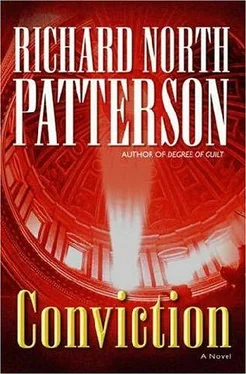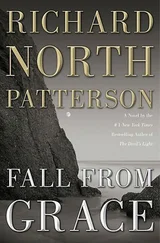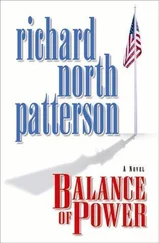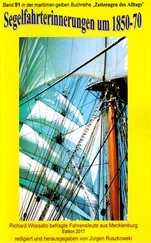Richard Patterson - Conviction
Здесь есть возможность читать онлайн «Richard Patterson - Conviction» весь текст электронной книги совершенно бесплатно (целиком полную версию без сокращений). В некоторых случаях можно слушать аудио, скачать через торрент в формате fb2 и присутствует краткое содержание. Жанр: Старинная литература, на английском языке. Описание произведения, (предисловие) а так же отзывы посетителей доступны на портале библиотеки ЛибКат.
- Название:Conviction
- Автор:
- Жанр:
- Год:неизвестен
- ISBN:нет данных
- Рейтинг книги:3 / 5. Голосов: 1
-
Избранное:Добавить в избранное
- Отзывы:
-
Ваша оценка:
- 60
- 1
- 2
- 3
- 4
- 5
Conviction: краткое содержание, описание и аннотация
Предлагаем к чтению аннотацию, описание, краткое содержание или предисловие (зависит от того, что написал сам автор книги «Conviction»). Если вы не нашли необходимую информацию о книге — напишите в комментариях, мы постараемся отыскать её.
Conviction — читать онлайн бесплатно полную книгу (весь текст) целиком
Ниже представлен текст книги, разбитый по страницам. Система сохранения места последней прочитанной страницы, позволяет с удобством читать онлайн бесплатно книгу «Conviction», без необходимости каждый раз заново искать на чём Вы остановились. Поставьте закладку, и сможете в любой момент перейти на страницу, на которой закончили чтение.
Интервал:
Закладка:
Tasha folded her arms, unable to look at anyone. Before she could form an answer, Mauriani decided that showing mercy, and even pity, would be better than forcing her to lie. Turning to Rotelli, he said, "I'll withdraw the question, Your Honor. I think we've done enough."
* * *
"That was the defense?" Carlo murmured.
"Yup." Terri unwrapped her tuna sandwich. "One bad alibi witness whose story James never checked out. Not much to show in exchange for Eula Price's house. Plus, Mauriani sandbagged James. His motion to exclude Bramwell was a charade. He already knew that she was lying—he intended to lose the motion, and then let James hang both his clients."
"Good, wasn't he?"
"Mauriani? The best. Shameless, too." She passed across the deli bag with "roast beef on rye" scrawled across it. "Eat your sandwich, then take a look at his final argument."
* * *
"Thuy Sen's death," Mauriani told the jury, "was the culmination of all you've heard. The witness who saw the brothers abduct her off the street. The sad traces of her last moments alive—a green thread, a fingerprint—in their living room. Semen and saliva, the residue of her anguish, on the defendants' rug and Eddie Fleet's car. The body which washed up where Fleet's testimony suggests it should have.
"What terrible luck these two must have. What an unhappy series of coincidences it is that every piece of evidence points to their guilt." Pausing, Mauriani looked into Candace Bender's eyes. "If all that's not enough," he said with muted anger, "remember the man Payton asked to murder Eddie Fleet."
Candace Bender glanced at the defendants, sitting mutely with their lawyer, and Mauriani chose this moment to stop and then nod toward Yancey James. "Mr. James," he continued, "is deeply experienced in capital cases. If a lawyer of his skills had any decent evidence casting doubt on his clients' guilt, don't you think you would have heard it? But all he had to offer was a misguided young woman who chose to tell a lie. As if," Mauriani added with quiet scorn, "the lies of a single witness would expunge the shocking and disgusting acts which took this child's life."
With this tacit reminder that neither brother had testified on his own behalf, Mauriani paused to survey the courtroom. Meng Sen was still and pale; across the gulf which separated them, Chou Sen covered her face to hide the tears Eula Price did not bother to conceal. But Payton looked defiant, and Rennell's face had become an emotionless mask. Mauriani could not have offered a more chilling depiction of their indifference to the torment of Thuy Sen.
"You see her murderers before you," he told the jury. "In the name of an innocent, find them guilty."
* * *
James's final argument took seven minutes. Mauriani had offered no witness to the death, he reminded the jurors, no physical evidence to prove that his clients caused it. All the prosecutor had was an old lady who despised them, a crack dealer who admitted disposing of the body, and a jailhouse snitch trying to get in good with the police.
He never mentioned Tasha Bramwell. Less than two hours after receiving Judge Rotelli's instructions, the jurors convicted Payton and Rennell Price of the felony murder of Thuy Sen. All that remained for them was to choose between life and death.
TWENTY
BY THE TIME TERRI AND CARLO BEGAN THE FINAL VOLUME OF the trial transcript, it was past eight o'clock, and dusk was gathering outside the floor-to-ceiling windows of the conference room. Lights glimmered from the city, from the distant hills of Sausalito, and from the cars which crept like illuminated soldier ants across the shadowy bridge which linked them. They had been here since dawn; Terri's eyes felt scratchy, and the cheese had begun to congeal on the two remaining slices of pizza in the open box between them.
"In 1987," Terri explained to Carlo, "the sentencing phase of a death penalty case worked pretty much the way it does now. The prosecutor presents the so-called aggravating factors, like the callousness or brutality of the crime itself, which support a sentence of death. Then the defense offers the 'mitigating factors' which cut against it—like character or mental state of the defendant, or his miserable personal history, or that he acted under the influence of someone else, or maybe drugs or alcohol. In theory, the jury finds for death only if the factors in its favor outweigh those against. Whether to impose death then lies with the judge."
Terri began flipping through the transcript. "According to Mauriani," she continued, "Payton and Rennell were forced to wear prison clothes at the sentencing phase. The idea was to remind the jurors that Payton and Rennell were different from the rest of humanity. Psychologically, it might make them a little easier to kill." Finding the first page she had marked with a paper clip, Terri passed the transcript to Carlo. "But here's where you'll find the one truly special touch. It'll help you appreciate how ruthless Mauriani could be."
* * *
On the witness stand, Thuy Sen's twelve-year-old sister, Kim, looked even smaller than she was, and her thin legs in a schoolgirl's red knee socks dangled without touching the floor. Dressed in bright orange jumpsuits, the brothers watched her; Payton closely, Rennell without expression. Anna Velez, Mauriani noted, dabbed away tears of sympathy; from her mother's testimony, the jury already knew that Kim still could barely eat or sleep. But Mauriani wanted the more clinical jurors, like Henry Feldt, to see this child for themselves.
"When you think of Thuy Sen," Mauriani softly asked her, "what do you remember?"
Kim seemed to choke on the words. When at last they emerged, it was in a light, whispery voice which her perfect diction only made more affecting. "That I didn't wait for her, like I should have." She swallowed, staring at the floor. "Because of me my sister's dead . . ."
Abruptly, the child covered her face. The only other sign that she was crying was the uncontrollable trembling of frail shoulders.
Chou Sen stood, face twisted in anguish.
Struck by regret, Mauriani nodded to her. But as she came forward for her surviving daughter, leading her from the courtroom, Mauriani saw the grim set of Henry Feldt's face.
* * *
"Jesus," Carlo murmured.
"Yeah." Terri discarded the last, half-eaten slice of pizza. "Kim Sen's twenty-seven now. But wherever she is, it's a fair bet she's wearing out some psychologist."
"How did James respond?"
"Start reading where I put the second clip," Terri answered, "and prepare to be amazed."
* * *
James paused to dab at his nose. "From your verdict," he told the jury, "you've cleared the legal hurdle called reasonable doubt. But that does not mean there is no doubt—with no witnesses to the death, there must be at least some lingering doubt." Theatrically, James flung his arms open wide. "In the presence of doubt, why condemn these men to death?
"They will die in prison, ladies and gentlemen, a threat to no one. You do not need to accelerate their demise."
In disbelief, Mauriani glanced at Henry Feldt. Frowning, Feldt had turned from James to his clients, studying them with the same lack of sympathy they had shown throughout the trial for Thuy Sen.
* * *
At the close of James's argument, Mauriani stood at once. "Your Honor, I ask the Court to meet in chambers with prosecution and defense counsel."
The keenness of Rotelli's glance confirmed his instant comprehension. "Very well," he said and motioned his courtroom deputy to open the door to his chambers.
They gathered inside, Mauriani and James seated in front of Angelo Rotelli's walnut desk, the court reporter set up to the side, surrounded by the trappings of a trial judge—tomes on evidence, treatises on trial practice, bound jury instructions, and green leather chairs suitable to the inner sanctum of a men's club.
Читать дальшеИнтервал:
Закладка:
Похожие книги на «Conviction»
Представляем Вашему вниманию похожие книги на «Conviction» списком для выбора. Мы отобрали схожую по названию и смыслу литературу в надежде предоставить читателям больше вариантов отыскать новые, интересные, ещё непрочитанные произведения.
Обсуждение, отзывы о книге «Conviction» и просто собственные мнения читателей. Оставьте ваши комментарии, напишите, что Вы думаете о произведении, его смысле или главных героях. Укажите что конкретно понравилось, а что нет, и почему Вы так считаете.












